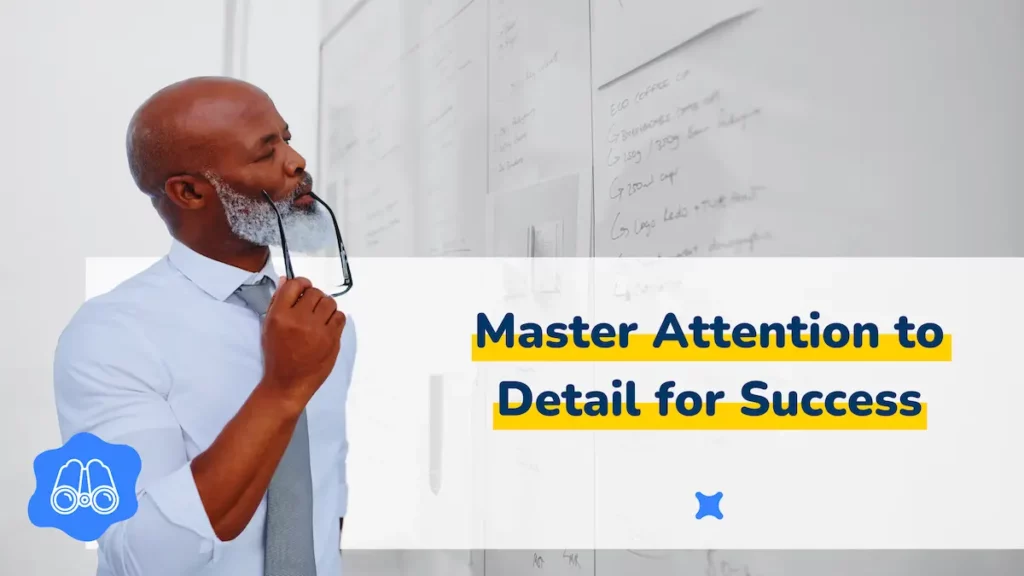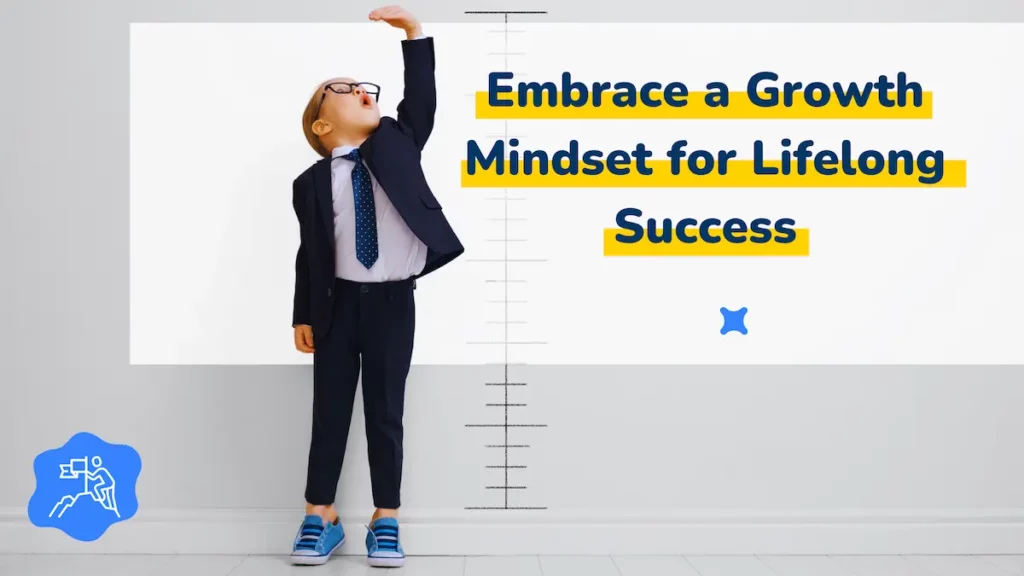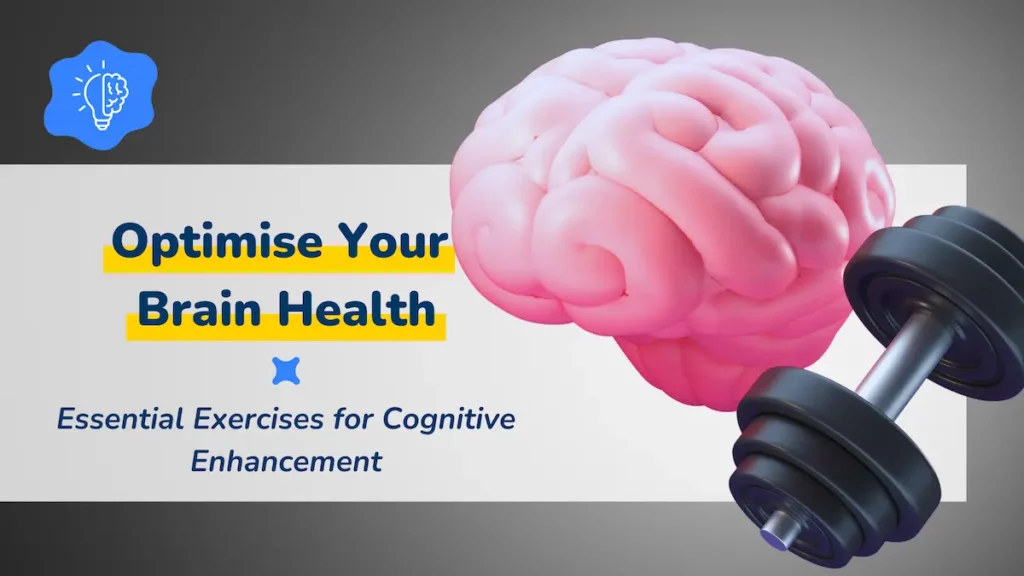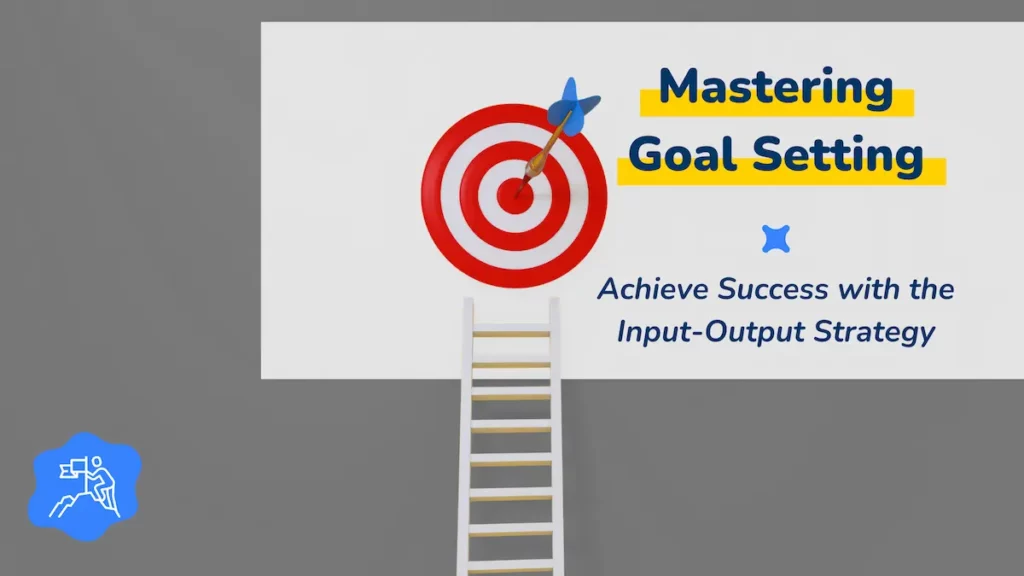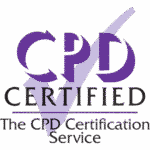If you prefer to read…
Understanding Attention to Detail
Attention to detail means paying close attention to the finer aspects of a task or situation. It involves observing, analysing, and comprehending even the minutest details. This skill is essential in various professions, from engineering to creative fields, as it ensures accuracy and high-quality outcomes.
Being detail-oriented is about more than just avoiding errors; it’s about striving for excellence in every aspect of your work. This mindset ensures that you not only meet but exceed expectations, delivering superior results that stand out.
This skill involves several key components:
Accuracy
Accuracy is about completing tasks without errors. It requires a meticulous approach to ensure that every aspect of the task meets the required standards. Accurate work reduces the need for rework and corrections, saving time and resources.
Thoroughness
Thoroughness ensures every part of a task is complete. It involves a comprehensive approach, making sure no detail is overlooked. Thoroughness often involves double-checking work and being diligent in follow-up.
Concentration
Concentration is the ability to stay focused on the task at hand. It involves avoiding distractions and maintaining a steady focus on the work until it is completed. Good concentration helps in achieving high accuracy and thoroughness.
Observation
Observation is about noticing and understanding subtle details that others might miss. It involves being attentive to the environment and the task, picking up on small cues that could be significant.
The Importance of Attention to Detail
Enhances Quality of Work
Attention to detail ensures that tasks are completed accurately and thoroughly, leading to high-quality outcomes. This is especially important in fields where precision is crucial, such as medicine, law, and engineering. High-quality work is often the result of careful planning, meticulous execution, and rigorous review processes—all of which require to master attention to detail.
Increases Efficiency
By focusing on details, you can identify potential issues early and address them before they escalate. This proactive approach saves time and resources, making processes more efficient. Efficiency is not just about speed; it’s about doing things right the first time to avoid rework and delays.
Builds Professional Reputation
Being detail-oriented builds a reputation for reliability and excellence. Employers and colleagues appreciate thoroughness, which can lead to more opportunities for career advancement. Your meticulousness can set you apart as a dependable and trustworthy professional who consistently delivers exceptional results.
Improves Problem-Solving Skills
Attention to detail helps in identifying the root causes of problems, leading to effective solutions. This skill is critical in troubleshooting and ensuring that you can resolve issues comprehensively. A detail-oriented approach ensures that no aspect of a problem is overlooked, resulting in more robust and lasting solutions.
Strategies to Master Attention to Detail
Develop a Systematic Approach
To master attention to detail, organise your tasks and break them down into smaller, manageable steps. A systematic approach helps ensure that no detail is overlooked and that each part of the task is completed thoroughly. You can apply this methodical process to any project, ensuring that you cover all bases and maintain high standards throughout.
- Create Checklists: Use checklists to keep track of tasks and ensure that all steps are completed.
- Prioritise Tasks: Focus on high-priority tasks first, but don’t neglect the smaller details that contribute to the overall success.
- Set Milestones: Break projects into phases with specific milestones to ensure consistent progress and attention to detail.
Practice Mindfulness
Mindfulness involves staying present and fully engaging with the task at hand. By practising mindfulness, you can improve your concentration and master attention to detail. Techniques such as meditation and deep-breathing exercises can enhance your focus.
- Meditation: Spend a few minutes each day meditating to clear your mind and improve your focus.
- Deep Breathing: Use deep-breathing exercises to centre yourself before starting detailed tasks.
- Mindful Breaks: Take regular breaks to reset your focus and avoid mental fatigue.
Double-Check Your Work
Always review your work to catch any mistakes or omissions. This practice not only improves accuracy but also helps refine your attention to detail over time. Make it a habit to double-check emails, reports, and other important documents.
- Proofreading: Read through your work multiple times, focusing on different aspects each time (e.g., grammar, content, formatting).
- Peer Review: Have a colleague review your work to catch mistakes you might have missed.
- Tool Utilisation: Use tools like spell checkers and grammar tools to help identify errors.
Seek Feedback
Regularly seek feedback from colleagues and supervisors. Constructive criticism can provide insights into areas where you might be missing details and help you improve your skills. Feedback is a valuable tool for continuous improvement.
- Ask for Specific Feedback: Encourage colleagues to point out specific details you may have missed.
- Regular Reviews: Schedule regular feedback sessions to track your progress.
- Implement Suggestions: Actively work on the feedback received to enhance your attention to detail.
Use Tools and Technology
Utilise tools such as checklists, calendars, and project management software to keep track of tasks and deadlines. These tools can help you stay organised and ensure that all details are accounted for.
- Checklists: Use digital or paper checklists to track task completion.
- Calendars: Set reminders and deadlines in digital calendars to stay on schedule.
- Project Management Software: Tools like Trello, Asana, or Microsoft Project can help manage complex projects and ensure no detail is overlooked.
Improve Your Observation Skills
Practise observing your environment and tasks closely. Engage in activities that require keen observation, such as puzzles or detailed crafts. These activities can enhance your ability to notice fine details and lead you to master attention to detail.
- Puzzles: Work on jigsaw puzzles, crosswords, or Sudoku to sharpen your observation skills.
- Detail-Oriented Hobbies: Engage in hobbies like drawing, painting, or model building that require close attention to detail.
- Observation Exercises: Practice exercises that require detailed observation, such as noting small changes in your surroundings or finding differences in images.
Stay Organised
A clutter-free workspace can significantly improve your ability to focus on details. Keep your workspace tidy and organised to minimise distractions and enhance and master your attention to detail.
- Declutter Regularly: Regularly clean and organise your workspace to maintain a conducive environment for detailed work.
- Use Organisers: Use trays, shelves, and filing systems to keep your workspace orderly.
- Digital Organisation: Organise your digital workspace by maintaining clean desktop and file structures.
Enhancing Attention to Detail with inGeniusly
Integrating Complementary Skills
Attention to detail often requires a combination of other cognitive skills such as focus, organisation, and critical thinking. inGeniusly integrates these complementary skills into its training programs, providing a comprehensive skill set that enhances your overall cognitive performance.
- Focus: Improving your ability to concentrate helps you stay on task and notice finer details without being distracted by irrelevant information.
- Organisation: Being organised allows you to manage tasks efficiently, ensuring that no detail is overlooked.
- Critical Thinking: Enhances your ability to analyse information logically and systematically, ensuring thoroughness in your work.
Organising Your Thoughts Effectively
One of the key challenges in paying attention to detail is organising your thoughts clearly and logically. inGeniusly helps you develop strategies to structure your thinking processes, making it easier to manage detailed tasks effectively.
- Mind Mapping: Helps visualise relationships between different aspects of a task, ensuring all details are considered.
- Structured Task Management: Provides frameworks to systematically address each part of a task, ensuring comprehensive attention to detail.
The Result: Enhanced Attention to Detail
Through its integration of complementary skills and focus on effective thought organisation, inGeniusly significantly enhances your attention to detail. This comprehensive training ensures that you are well-prepared to tackle complex tasks with precision and excellence.
A Systematic Approach
Attention to detail is a valuable skill that enhances the quality of work, increases efficiency, and builds a professional reputation. By developing a systematic approach, practising mindfulness, double-checking your work, seeking feedback, using tools, improving observation skills, and staying organised, you can master this skill. Additionally, leveraging the integrated training provided by inGeniusly can further enhance your attention to detail by focusing on related skills such as focus and organisation. Embrace these strategies to ensure excellence in your tasks and advance your career. Attention to detail is not just about avoiding mistakes; it’s about striving for perfection and consistently delivering high-quality results.
FAQs
What does attention to detail mean?
Attention to detail means paying close attention to the finer aspects of a task or situation. It involves being meticulous, precise, and thorough in observing, analyzing, and comprehending even the minutest details. This skill is essential for ensuring accuracy and high-quality outcomes in various fields.
Why is attention to detail important?
Attention to detail is crucial because it enhances the quality of work, increases efficiency, builds a professional reputation, and improves problem-solving skills. It helps in catching mistakes, ensuring thoroughness, and delivering superior results, which are valued in professional and personal realms.
How can I develop a systematic approach to enhance attention to detail?
To develop a systematic approach, organise your tasks by breaking them down into smaller, manageable steps. Use checklists to keep track of tasks, prioritise tasks to focus on high-priority items first, and set milestones to ensure consistent progress. This methodical process helps ensure no detail is overlooked.
What role does mindfulness play in improving attention to detail?
Mindfulness involves staying present and fully engaging with the task at hand. By practicing mindfulness through techniques like meditation and deep-breathing exercises, you can improve your concentration and attention to detail. Mindful breaks also help reset your focus and avoid mental fatigue.
Why is double-checking your work important for attention to detail?
Double-checking your work helps catch mistakes or omissions, improving accuracy and refining your attention to detail over time. It involves proofreading, peer reviews, and using tools like spell checkers to ensure that all aspects of a task are correct and complete.
How can feedback help improve attention to detail?
Seeking regular feedback from colleagues and supervisors provides insights into areas where you might be missing details. Constructive criticism helps you understand and address these gaps, leading to continuous improvement. Implementing suggestions from feedback enhances your overall attention to detail skills.
What tools and technologies can aid in maintaining attention to detail?
Various tools and technologies can help maintain attention to detail, such as checklists, calendars, and project management software. These tools assist in staying organised, tracking tasks, setting reminders, and managing complex projects to ensure all details are accounted for.
How can improving observation skills enhance attention to detail?
Improving observation skills involves practicing activities that require keen observation, such as puzzles or detailed crafts. These activities enhance your ability to notice fine details, which translates to better attention to detail in professional tasks.
What are some strategies to stay organised for better attention to detail?
To stay organised, keep your workspace clutter-free, use trays, shelves, and filing systems for organisation, and maintain a clean digital workspace. Regularly decluttering and organising your workspace minimises distractions and enhances your focus on details.
How does inGeniusly help in enhancing attention to detail?
inGeniusly integrates complementary skills such as focus, organisation, and critical thinking into its training programs. It helps you develop strategies to structure your thinking processes, making it easier to manage detailed tasks effectively. This comprehensive training significantly enhances your attention to detail.
What is the overall benefit of mastering attention to detail?
Mastering attention to detail ensures excellence in your tasks, enhances the quality of work, increases efficiency, builds a professional reputation, and improves problem-solving skills. It prepares you to tackle complex tasks with precision and excellence, advancing your career and personal success.
